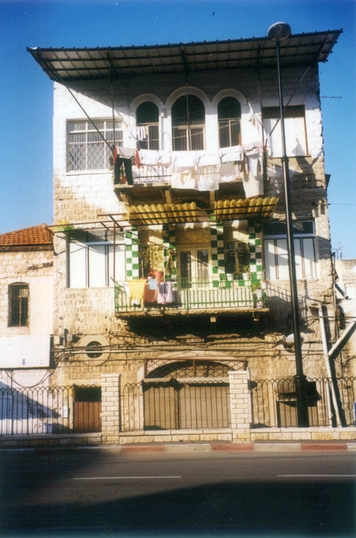
Residential building on Allenby Street, Haifa
|
 Residential building on Allenby Street, Haifa |
| April 18, departure: |
|
I get up early pack, and catch the bus to Haifa. I'm hoping to meet Muhammad Abu Hayja in Ayn Houd.21 He's told me that he'll be there from 10am onwards. In my haste and ignorance I don't ask him, which Ayn Houd? There are in fact two, the original one that was turned by Israelis into an artists' colony after it was emptied of its Palestinian inhabitants; and Ayn-Houd al-Jadideh, an 'unrecognized village' built by refugees from Ayn Houd in the wooded hills of Mount Carmel. 22 This, my last work day in 'Israel'/'Palestine', is a disaster, amusing in retrospect though painful at the time.
There's a bus from Haifa bus station that stops at a junction near Ayn Houd. What no one tells me is that from the junction to the village is a 5-kilometer walk, mostly uphill. In the rush to catch the bus, I haven't managed to phone Muhammad to confirm our meeting. There's no phone at the junction, no café or shop. A second thing I don't know is that there's no transport from the old Ayn Houd to the new one, and no proper road, only a dirt track that leads past an Israeli settlement to Ayn Houd al-Jadeedeh, which means that few Palestinians will be using it. Not much hope of a lift. Two friendly Jewish women give me a lift uphill to Ayn Houd. One says she likes to take tourists to Ayn Houd, though she is a bit dismayed to hear that it's the Arab village I'm trying to reach. We reach the Jewish Ayn Houd and I try to phone to Muhammad from a public phone box. His cell phone is closed. I phone the office in Haifa. He has just walked in. He says he waited for my call and when it didn't come he left for Haifa. I have to walk back to the bus stop for Haifa. Luckily it's |
a beautiful day, the sun isn't too strong, and the scenery is gorgeous; only the tarmac is a pain.
Back in Haifa, in the St Charles Hospice, I try to set up appointments. My plan is to do three more recordings: with someone from an unrecognized village; with Nozili, a woman who never left Haifa for even a day; and with Majed Khamra's mother. I can't get through to Nozili. Majed Khamra has a meeting. Muhammad Abu Hayja hopes he can find someone from an 'unrecognised' village for tomorrow, but isn't sure. And the long Jewish feast of Pessakh is coming up, which means at least a day without public transport. Every researcher or journalist knows times like this when nothing works, you just have to sit it through until things start to open up. Another problem: from Haifa I haven't been able to get through the MEA's office in Amman to change my return booking. This would be easier from Jerusalem. On Tuesday morning Muhammad Hayja's secretary says he has had to go urgently to the Nagab. But perhaps something could be arranged for Friday? I try Nozili's number again. Still no reply. Maybe it would be best to get back to Jerusalem before Pessakh begins? I could be stuck in Haifa for days with no recordings. My spirits are raised by meeting Katya, a German student working on a doctoral proposal on post-Oslo relations between Palestinians in Israel and those in Gaza and the West Bank. We chat for a while about politics and people we know. The next day I return to Jerusalem. |
[Umm Bassel] Copyright©2005 |
|